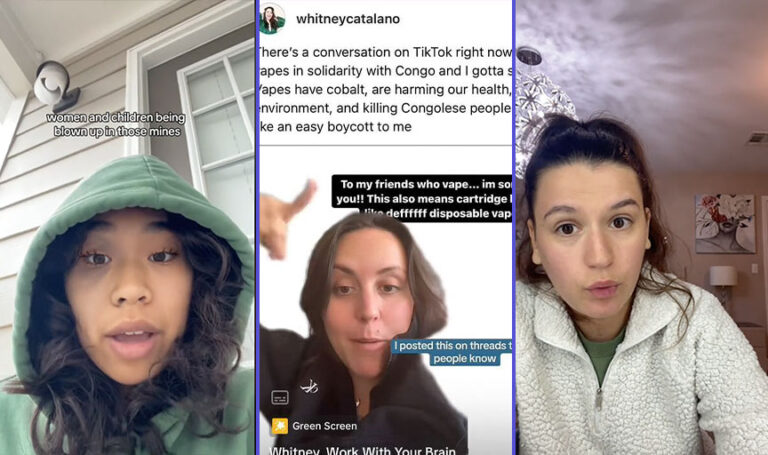Gen Z on TikTok are quitting vaping in solidarity with Congo

Over the past week or so, TikTok has become a platform for a unique form of activism, with users across the Western world abandoning vaping, not because of health concerns or financial reasons, but as a protest against child labour in the Democratic Republic of Congo (DRC). This movement gained momentum after calls to limit electronic waste went viral on the popular social media platform.
On 16 November 2023, TikTok creator @itskristinamf kicked off the trend by posting a video, which now has over 1.7 million views, in which she stated: “I know these are the last words you thought you’d ever hear me say in my f*cking life, but I’m quitting vaping. I’m officially f*cking done.”
@itskristinamf #freecongo i have been reposting more information on this topic maybe i sound insane idgaf anymore this world is insane and i dont wanna contribute any more to it
♬ original sound - Krizztina
The creator goes on to state that the reason she wants to quit is because she’s become aware of the humanitarian crisis in Congo, and how the West’s demand for cobalt—an essential component of electric devices—is resulting in a massive child labour emergency. “I’ve been learning what’s going in Congo and the conditions over there because of f*cking cobalt, because we need these for electronics,” Kristina noted.
Following this, a number of other gen Zers took to TikTok to state that they would also be giving up vaping in solidarity with the Congolese people.
@marajazzcabbage to my fellow vapers and stoners. lets #freecongo too #congo #congolaise🇨🇩
♬ original sound - MJ‼️🍉
The ongoing conflict has led to the displacement of approximately six million people, subjecting them to challenges such as hunger and gender-based violence.
The DRC’s turmoil is concentrated in its eastern provinces which are rich in minerals like cobalt, a vital component in the creation of lithium-ion batteries used in electronic devices, including phones, electric vehicles, and vapes. Approximately 74 per cent of the world’s cobalt was mined in the DRC in 2021, according to the Cobalt Institute. As the demand for cobalt grows, the mining industry’s expansion has led to increased displacement and violence in the region.
As users pledge to quit vaping in support of the DRC, the movement sheds light on the hazardous conditions of cobalt mining, described by expert Siddharth Kara as modern-day slavery: “Cobalt is toxic to touch and breathe—and there are hundreds of thousands of poor Congolese people touching and breathing it day in and day out. Young mothers with babies strapped to their backs, all breathing in this toxic cobalt dust.”
The US Department of Labor, recognising the exploitation of child labour in cobalt mining, added lithium-ion batteries to its list of products created by child labour in 2022.
Users on TikTok are using their platform to educate and raise awareness about the dire conditions in the DRC. The trend is also addressing the staggering amount of electronic waste generated globally. An estimated 150 million vapes are discarded each year, contributing to billions of dollars worth of materials, including cobalt, being dumped into landfills. This waste not only harms the environment but also perpetuates the demand for more cobalt, fueling the ongoing conflict in the DRC.
As this movement gains traction, users are reshaping the conversation around quitting vaping, transforming it from a personal choice to a collective action for a global cause. Amid concerns about health, the focus has shifted to the interconnectedness of consumer choices and their impact on vulnerable communities, urging individuals to consider the ethical implications of their habits.
@whitneycatalano #greenscreen someone got mad at me for not quitting vapes until I learned about congo… even though I dont even vape #quitvapes #congo #vaping #boycottvapes
♬ original sound - Whitney Catalano
In the comment section of one video, a user poignantly noted: “It’s funny, I won’t quit for my health, but I will quit in solidarity for the Congo.”
In recent months, TikTok has emerged as a powerful force for social change, galvanising users to participate in various boycott movements against companies implicated in human rights abuses. Notable instances include pro-Palestine campaigns targeting McDonald’s and Disney. This movement reflects a growing trend of leveraging the power of social media against corporate practices that compromise human rights.





